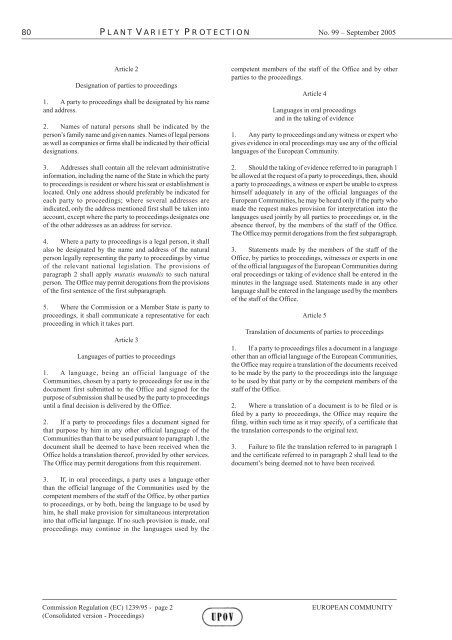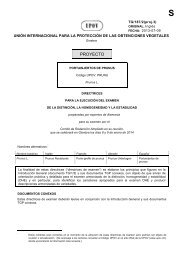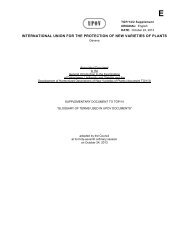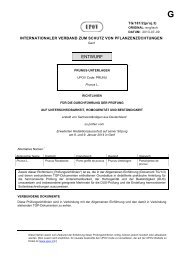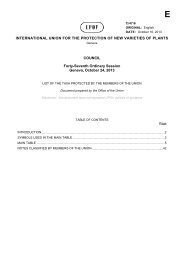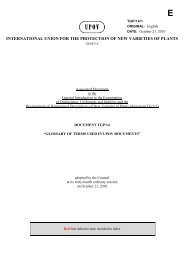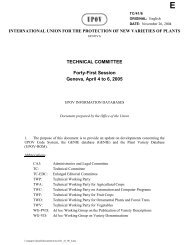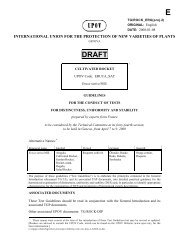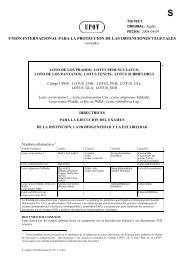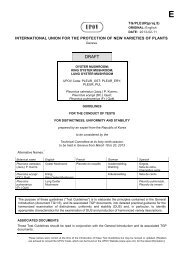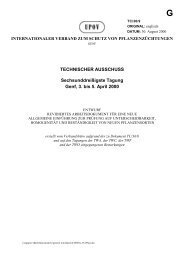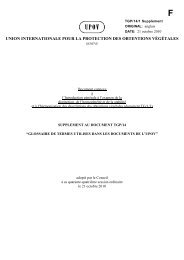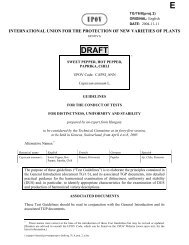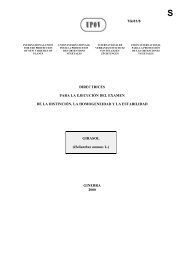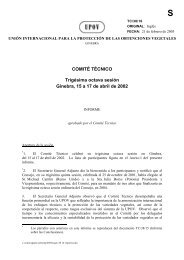plant variety protection - International Union for the Protection of ...
plant variety protection - International Union for the Protection of ...
plant variety protection - International Union for the Protection of ...
You also want an ePaper? Increase the reach of your titles
YUMPU automatically turns print PDFs into web optimized ePapers that Google loves.
80 PLANT VARIETY PROTECTION No. 99 – September 2005<br />
Article 2<br />
Designation <strong>of</strong> parties to proceedings<br />
1. A party to proceedings shall be designated by his name<br />
and address.<br />
2. Names <strong>of</strong> natural persons shall be indicated by <strong>the</strong><br />
person’s family name and given names. Names <strong>of</strong> legal persons<br />
as well as companies or firms shall be indicated by <strong>the</strong>ir <strong>of</strong>ficial<br />
designations.<br />
3. Addresses shall contain all <strong>the</strong> relevant administrative<br />
in<strong>for</strong>mation, including <strong>the</strong> name <strong>of</strong> <strong>the</strong> State in which <strong>the</strong> party<br />
to proceedings is resident or where his seat or establishment is<br />
located. Only one address should preferably be indicated <strong>for</strong><br />
each party to proceedings; where several addresses are<br />
indicated, only <strong>the</strong> address mentioned first shall be taken into<br />
account, except where <strong>the</strong> party to proceedings designates one<br />
<strong>of</strong> <strong>the</strong> o<strong>the</strong>r addresses as an address <strong>for</strong> service.<br />
4. Where a party to proceedings is a legal person, it shall<br />
also be designated by <strong>the</strong> name and address <strong>of</strong> <strong>the</strong> natural<br />
person legally representing <strong>the</strong> party to proceedings by virtue<br />
<strong>of</strong> <strong>the</strong> relevant national legislation. The provisions <strong>of</strong><br />
paragraph 2 shall apply mutatis mutandis to such natural<br />
person. The Office may permit derogations from <strong>the</strong> provisions<br />
<strong>of</strong> <strong>the</strong> first sentence <strong>of</strong> <strong>the</strong> first subparagraph.<br />
5. Where <strong>the</strong> Commission or a Member State is party to<br />
proceedings, it shall communicate a representative <strong>for</strong> each<br />
proceeding in which it takes part.<br />
Article 3<br />
Languages <strong>of</strong> parties to proceedings<br />
1. A language, being an <strong>of</strong>ficial language <strong>of</strong> <strong>the</strong><br />
Communities, chosen by a party to proceedings <strong>for</strong> use in <strong>the</strong><br />
document first submitted to <strong>the</strong> Office and signed <strong>for</strong> <strong>the</strong><br />
purpose <strong>of</strong> submission shall be used by <strong>the</strong> party to proceedings<br />
until a final decision is delivered by <strong>the</strong> Office.<br />
2. If a party to proceedings files a document signed <strong>for</strong><br />
that purpose by him in any o<strong>the</strong>r <strong>of</strong>ficial language <strong>of</strong> <strong>the</strong><br />
Communities than that to be used pursuant to paragraph 1, <strong>the</strong><br />
document shall be deemed to have been received when <strong>the</strong><br />
Office holds a translation <strong>the</strong>re<strong>of</strong>, provided by o<strong>the</strong>r services.<br />
The Office may permit derogations from this requirement.<br />
3. If, in oral proceedings, a party uses a language o<strong>the</strong>r<br />
than <strong>the</strong> <strong>of</strong>ficial language <strong>of</strong> <strong>the</strong> Communities used by <strong>the</strong><br />
competent members <strong>of</strong> <strong>the</strong> staff <strong>of</strong> <strong>the</strong> Office, by o<strong>the</strong>r parties<br />
to proceedings, or by both, being <strong>the</strong> language to be used by<br />
him, he shall make provision <strong>for</strong> simultaneous interpretation<br />
into that <strong>of</strong>ficial language. If no such provision is made, oral<br />
proceedings may continue in <strong>the</strong> languages used by <strong>the</strong><br />
competent members <strong>of</strong> <strong>the</strong> staff <strong>of</strong> <strong>the</strong> Office and by o<strong>the</strong>r<br />
parties to <strong>the</strong> proceedings.<br />
Article 4<br />
Languages in oral proceedings<br />
and in <strong>the</strong> taking <strong>of</strong> evidence<br />
1. Any party to proceedings and any witness or expert who<br />
gives evidence in oral proceedings may use any <strong>of</strong> <strong>the</strong> <strong>of</strong>ficial<br />
languages <strong>of</strong> <strong>the</strong> European Community.<br />
2. Should <strong>the</strong> taking <strong>of</strong> evidence referred to in paragraph 1<br />
be allowed at <strong>the</strong> request <strong>of</strong> a party to proceedings, <strong>the</strong>n, should<br />
a party to proceedings, a witness or expert be unable to express<br />
himself adequately in any <strong>of</strong> <strong>the</strong> <strong>of</strong>ficial languages <strong>of</strong> <strong>the</strong><br />
European Communities, he may be heard only if <strong>the</strong> party who<br />
made <strong>the</strong> request makes provision <strong>for</strong> interpretation into <strong>the</strong><br />
languages used jointly by all parties to proceedings or, in <strong>the</strong><br />
absence <strong>the</strong>re<strong>of</strong>, by <strong>the</strong> members <strong>of</strong> <strong>the</strong> staff <strong>of</strong> <strong>the</strong> Office.<br />
The Office may permit derogations from <strong>the</strong> first subparagraph.<br />
3. Statements made by <strong>the</strong> members <strong>of</strong> <strong>the</strong> staff <strong>of</strong> <strong>the</strong><br />
Office, by parties to proceedings, witnesses or experts in one<br />
<strong>of</strong> <strong>the</strong> <strong>of</strong>ficial languages <strong>of</strong> <strong>the</strong> European Communities during<br />
oral proceedings or taking <strong>of</strong> evidence shall be entered in <strong>the</strong><br />
minutes in <strong>the</strong> language used. Statements made in any o<strong>the</strong>r<br />
language shall be entered in <strong>the</strong> language used by <strong>the</strong> members<br />
<strong>of</strong> <strong>the</strong> staff <strong>of</strong> <strong>the</strong> Office.<br />
Article 5<br />
Translation <strong>of</strong> documents <strong>of</strong> parties to proceedings<br />
1. If a party to proceedings files a document in a language<br />
o<strong>the</strong>r than an <strong>of</strong>ficial language <strong>of</strong> <strong>the</strong> European Communities,<br />
<strong>the</strong> Office may require a translation <strong>of</strong> <strong>the</strong> documents received<br />
to be made by <strong>the</strong> party to <strong>the</strong> proceedings into <strong>the</strong> language<br />
to be used by that party or by <strong>the</strong> competent members <strong>of</strong> <strong>the</strong><br />
staff <strong>of</strong> <strong>the</strong> Office.<br />
2. Where a translation <strong>of</strong> a document is to be filed or is<br />
filed by a party to proceedings, <strong>the</strong> Office may require <strong>the</strong><br />
filing, within such time as it may specify, <strong>of</strong> a certificate that<br />
<strong>the</strong> translation corresponds to <strong>the</strong> original text.<br />
3. Failure to file <strong>the</strong> translation referred to in paragraph 1<br />
and <strong>the</strong> certificate referred to in paragraph 2 shall lead to <strong>the</strong><br />
document’s being deemed not to have been received.<br />
Commission Regulation (EC) 1239/95 - page 2 EUROPEAN COMMUNITY<br />
(Consolidated version - Proceedings)


